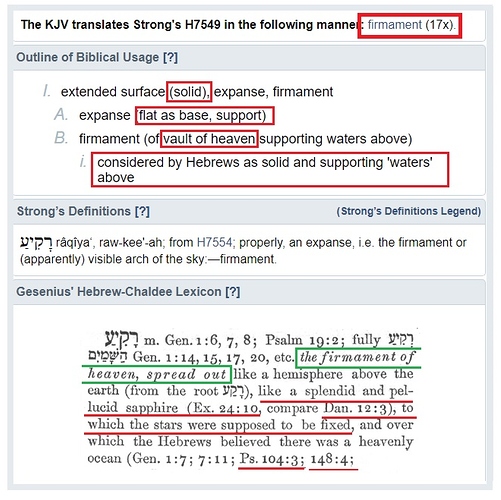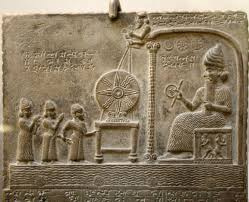@Christy, Yes, I see your reference. But I was speaking about a different text I believe… and in an earlier posting to @Reggie_O_Donoghue, I presented two groups of translations:
One group makes Raqia an “expanse” of nothingness… and the other group makes it an “expanse” of something!
^^^^^^^^^^^^^^^^^^^^^^^^^^^^^^^^^^^^^^^^^^^^^^^^^^^^^^^^^^^^^^^^^^^^^
^^^^^^^^^^^^^^^^^^^^^^^^^^^^^^^^^^^^^^^^^^^^^^^^^^^^^^^^^^^^^^^^^^^^^
As you can see in this “definition” from Strong’s (Blueletter Version), each time the word “expanse” is used, it is associated with the term of something that means something solid:
“extended surface (solid), expanse…” or “expanse (flat as base, support)” - There is even an explanatory note: “considered by Hebrews as solid and supporting ‘waters’ above”.
Strong’s translates H7549 17 times. And each time it is translated with the English neologism: “firmament”, derived from the Latin for something “firm”… like a “floor”… or a “ceiling”.
Replace the Firmness with the Nothingness
I have provided 15 quotes from the various bibles conveniently extracted in the Blueletter tool. 8 of these quotes have removed the word and the meaning of “solid” or “firm” from the verse entirely. The translators clearly didn’t want to make it look like the scribes of Genesis didn’t know how the solar system worked. So instead of suggesting that there was something solid that separated the waters… they simply said “the expanse” separated the waters! Now we just have waters up there … all on their own. Does that improve the reading?
8 Translations for Gen 1:7 that replace “firm/firmament” with an “expanse of nothingness”:
NET: New English Translation
So God made the expanse and separated the water under the expanse from the water above it. It was so.
NLT: New Living Translation
And that is what happened. God made this space to separate the waters of the earth from the waters of the heavens.
NASB: New American Standard Bible
God made the expanse, and separated the waters which were below the [fn]expanse from the waters which were above the [fn]expanse; and it was so.
HNV: Hebrew Names Version
God made the expanse, and divided the waters which were under the expanse from the waters which were above the expanse, and it was so.
CSB: Christian Standard Bible
So God made the expanse and separated the water under the expanse from the water above the expanse. And it was so.
YLT: Young’s Literal Translation
And God maketh the expanse, and it separateth between the waters which are under the expanse, and the waters which are above the expanse: and it is so.
DBY: Darby Translation
And God made the expanse, and divided between the waters that are under the expanse and the waters that are above the expanse; and it was so.
ESV: English Standard Version
And God made the expanse and separated the waters that were under the expanse from the waters that were above the expanse. And it was so.
.
.
.
.
Okay, so how did “empty expanse” separate the waters? Is this just a magic trick? And if there is literally nothing solid up there, holding up the waters, how does this solve your problem? We are still stuck with all that water up there!
But let’s look at the 7 versions that admit that there is something solid up there…
7 Translations for Gen 1:7 that explicitly state there is something up there holding up the waters
KJV: King James Version
And God made the firmament, and divided the waters which were under the firmament from the waters which were above the firmament: and it was so.
RSV: Revised Standard Version
And God made the firmament and separated the waters which were under the firmament from the waters which were above the firmament. And it was so.
NKJV: New King James Version
Thus God made the firmament, and divided the waters which were under the firmament from the waters which were above the firmament; and it was so.
NIV: New International Version
So God made the vault and separated the water under the vault from the water above it. And it was so.
ASV: American Standard Version
And God made the firmament, and divided the waters which were under the firmament from the waters which were above the firmament: and it was so.
WEB: Webster’s Bible
And God made the firmament; and divided the waters which wereunder the firmament from the waters which were above the firmament: and it was so.
VUL: Vulgate
et fecit Deus firmamentum divisitque aquas quae erant sub firmamento ab his quae erant super firmamentum et factum est ita
.
.
.
.
^^^^^^^^^^^^^^^^^^^^^^^^^^^^^^^^^^^^^^^^^^^^^^^^^^^
^^^^^^^^^^^^^^^^^^^^^^^^^^^^^^^^^^^^^^^^^^^^^^^^^^^
[End of Extract]


